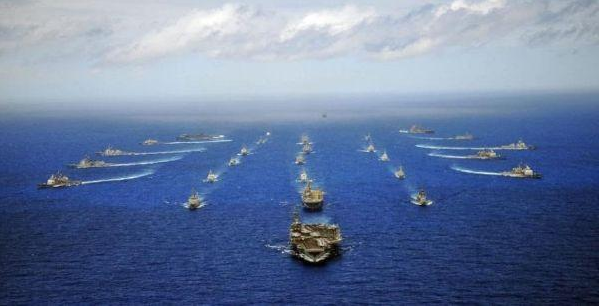
By Du Wenlong
As a result of the strong appeal of the Japanese government, RIMPAC 2020 hosted by the US Navy will be held in Hawaii in August, according to Japanese media reports. The reports said that the US had once planned to cancel the military exercise this year, amid concerns of the COVID-19 pandemic. However, the Japanese government strongly urged the US military to host RIMPAC 2020 as scheduled.
Against the backdrop of the COVID-19, Japan’s move is intended to strengthen its role in the US-Japan alliance, strengthen the Japanese Maritime Self-Defense Force (JMSDF)’s comprehensive combat capabilities, and create more opportunities for Japan to strengthen all-round cooperation with the US in the Western Pacific in the future.
First, hosting RIMPAC 2020 amid the global pandemic could play an important role in strengthening the alliance between Japan and the US in the Pacific Ocean. Whether the exercise is conducted in Guam or the waters off Hawaii, the JMSDF would become the main force. If the number of participating militaries is relatively small, then the number of US warships and combat ships of other countries will correspondingly be small. In the circumstances, Japan’s role will be stronger than ever. Therefore, highlighting Japan’s role in the Japan-US alliance may be the primary choice. Second, as the US ally in the RIMPAC, Japan can conduct joint exercises with the US in some high-confidential subjects, and the comprehensive combat capability of its weapons and equipment can also be tested to a certain extent. The exercise will play an important role in improving the JMSDF’s long-range combat and offensive capabilities. On this basis, if Japan can make more friends, build more military relations, and obtain more s allies, the JMSDF can go further and faster. Therefore, Japan’s attitude is likely to be a manifestation of promoting military normalization.
In recent years, with the acceleration of the shift of the US global strategic focus to the Asia-Pacific region, it has got increasingly relied on Japan’s role in the region. Therefore, the future US-Japan alliance will be further strengthened in both traditional and non-traditional security dimensions.
First, the US-Japan alliance is indispensable and will play a major role in advancing from Asia-Pacific to Indo-Pacific. At present, although it is a one-ocean strategy in the Western Pacific, that is, the Pacific strategy, with the implementation of the Indo-Pacific strategy in the future, it will radiate to the Indian Ocean through the South China Sea. And it can change from one ocean to two oceans and from a small combat space to a large one. It is foreseeable that if the US-Japan alliance can expand into the US-Japan-Australia alliance and develop from one line to a large triangular relationship, then the roles Japan and the US play cannot be underestimated in the process of this strategic advancement.
Second, the US and Japan hope that Japan’s role and its influence on the surrounding areas will be further enhanced through such exercises. For example, the development of military ties between Japan and the US is accelerating. Five Osprey transport aircraft have been delivered, and the order for another 17 will greatly increase Japan’s maritime attack capabilities. Moreover, the Izumo-class helicopter carrier has recently removed the Phalanx Close-In Weapon System (CIWS) in the bow of the ship,in a bid to embark F-35B stealth fighters.
To sum up, military and technical collaborations, including combat training exercises centering on the maritime offensive and defensive, between Japan and the US are much closer than ever recently. This also shows that Japan is very consistent with the US in terms of joint maritime operations and joint training as well as the Indo-Pacific strategic process. The two sides can carry out more in-depth cooperation. It also indicates that the JMSDF will take the initiative in Japan’s future military normalization.
(The author Du Wenlong is a retired senior colonel who had been engaged in research works about military construction under China’s PLA Academy of Military Sciences. He is now a special commentator for the CCTV military channel.)
Disclaimer: This article is originally published on cnr.cn and translated from Chinese into English and edited by the China Military Online. The information, ideas or opinions appearing in this article do not necessarily reflect the views of eng.chinamil.com.cn.













